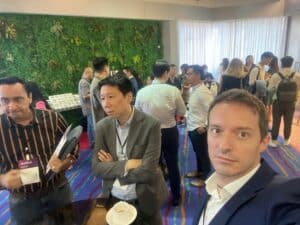Recently the Singapore and Hong Kong teams attended the Retail Asia Summit which took place in Singapore on the 16th of November.
This particularly important event for Retail leaders seamlessly brought together industry luminaries, seasoned experts, and influential business leaders, collectively shaping Asia’s dynamic retail landscape.
After the plenary morning session, Argon & Co’s Andrea Carnino (Principal Consultant, Singapore) hosted the technology afternoon track which culminated in the payment panel discussion: “Revolutionizing Retail with Technology: Opportunities and Challenges”, also moderated by Andrea.
Throughout the day as well as our hosted session, the team picked up on several key takeaways and findings, including:
- Revolutionizing Retail (by BCG): Navigating digital transformation, omnichannel strategies, evolving store formats, customer trends, innovative concept stores, and the AI frontier:
In the ever-evolving landscape of retail, a revolution is underway. This transformative journey encompasses a strategic response to the digital age, the integration of omnichannel strategies, the adaptation to evolving store formats emphasizing convenience, a keen understanding of dynamic customer trends, the establishment of innovative concept stores (like Freshippo), and the incorporation of artificial intelligence at the forefront of industry innovation. However, this final aspect of AI integration is the one that most retail companies are still struggling to embrace. Retailers should then keep in mind four main concepts:
- Small format disruption is here to stay
- ‘Omni’ is necessary
- Loyalty and personalisation will help maximise customer value
- AI is the future source of competitive advantage
- Sustainable Futures (by DFI Retail Group): Navigating the challenges and opportunities in scope 3 analysis, supply chain footprints, aggressive DFI initiatives on scope 1 and 2, governance for process control and modern slavery surveillance, packaging innovations for a circular economy, fact-based sustainability reporting, customer perceptions of ‘Net 0,’ and strategic technology investments for carbon footprint reduction:
Embarking on ‘Sustainable Futures’ involves a comprehensive exploration of the intricate landscape surrounding environmental responsibility. This journey encompasses the nuanced challenges and opportunities within Scope 3 analysis, the significant impact of supply chain footprints, and the proactive initiatives undertaken by DFI Retail Group in Scope 1 and 2 (e.g., reducing water consumption, implementing solar panels). Additionally, a vigilant focus on governance ensures effective process control and modern slavery surveillance. The roadmap also navigates through innovations in packaging, fostering a circular economy with recyclable and biodegradable materials. Furthermore, the journey relies on fact-based sustainability reporting, addresses customer perceptions of ‘Net 0,’ and strategically invests in technology to reduce carbon footprints, thus paving the way for a conscientious and sustainable future.
- Frontiers of Influence (by YCP Solidiance): Unravelling the threads of consumer behaviour, social media dynamics, and unavoidable technological trends with Indonesia paving the path:
Exploring the ‘Frontiers of Influence’ involves a deep dive into the complex and interconnected realms of consumer behaviour, social media dynamics, and the inevitable force of technological trends. This journey unravels the threads that weave together these influential aspects, shaping the present and future landscape. Notably, Indonesia emerges as a trailblazer, leading the way in Southeast Asian e-commerce, both in terms of number of users (also due to its large population) and market volume, and companies like Shopee, Lazada and Tokopedia dominate the online market. To win in this digital revolution, retailers in Southeast Asia should:
- Adapt to local preferences
- Integrate physical and digital experiences
- Embrace change management in digital transformation
- Navigating the Confusion (by Google): Overcoming decision paralysis in the face of information overload, misleading information, and the confidence gap amid geopolitical uncertainty:
In the intricate landscape of decision-making, the challenge lies in ‘Navigating the Confusion.’ This journey delves into the complexities of overcoming decision paralysis, a phenomenon exacerbated by information overload, the prevalence of misleading information, and the looming presence of the confidence gap. Against the backdrop of geopolitical uncertainty, individuals and organizations are confronted with the task of deciphering truth from noise and fostering confidence in their choices. Google ran an experiment to understand how behavioural science (BeSci) principles can impact customer choice and summarized the findings in three simple points:
- More exposure can help brands win share
- Communicating the value clearly can double the brand share
- Reviews are more impactful than price




